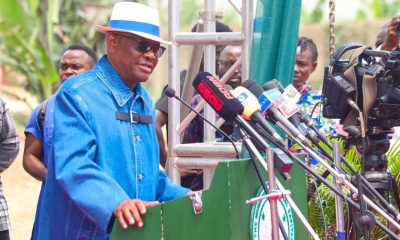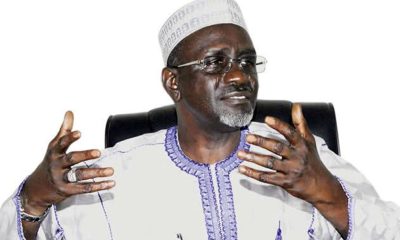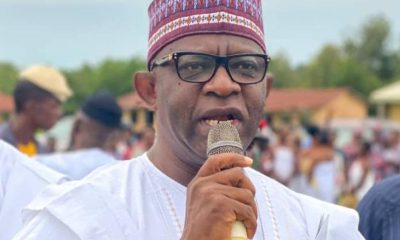metro
SERAP sues Tinubu over ‘failure to probe missing $2.1bn, N3.1trn of subsidy payments’

SERAP sues Tinubu over ‘failure to probe missing $2.1bn, N3.1trn of subsidy payments’
Socio-Economic Rights and Accountability Project (SERAP) has filed a lawsuit against President Bola Ahmed Tinubu over “the failure to probe the allegations that USD$2.1 billion and N3.1 trillion public funds of oil revenues and budgeted as fuel subsidy payments are missing and unaccounted for between 2016 and 2019.”
The suit followed the grim allegations documented by the Auditor-General of the Federation in the 2016 and 2019 annual reports that the public funds are missing.
In the suit number FHC/L/CS/1107/23 filed last Friday at the Federal High Court in Lagos, SERAP is seeking: “an order of mandamus to direct and compel President Tinubu to promptly probe allegations that USD$2.1 billion and N3.1 trillion public funds are missing and unaccounted for between 2016 and 2019.”
SERAP is also seeking: “an order of mandamus to compel President Tinubu to direct the anti-corruption agencies to promptly probe fuel subsidy payments made by governments since the return of democracy in 1999, name and shame and prosecute suspected perpetrators, and to recover any proceeds of crimes.”
READ ALSO:
- Reps Speakership: Tajudeen Abbas’ chances boosted as Betara, Gagdi quit
- You can’t investigate Emefiele, transfer case to EFCC, Falana tells DSS
- El-Rufai comments: Democracy game of numbers, Sharia Council tackles CAN
SERAP is also seeking: “an order of mandamus to direct and compel President Tinubu to use any recovered proceeds of crime as palliatives to address the impact of the subsidy removal on poor Nigerians, and to put in place mechanisms for transparency and accountability in the oil sector.”
In the suit, SERAP is arguing that: “The allegations that US$2.1 billion and N3.1 trillion of public funds are missing and unaccounted amount to a fundamental breach of national anticorruption laws and the country’s international obligations including under the UN Convention against Corruption to which Nigeria is a state party.”
SERAP is also arguing that, “The Tinubu government has constitutional and international legal obligations to get to the bottom of these allegations and ensure accountability for these serious crimes against the Nigerian people.”
According to SERAP, “Directing and compelling President Tinubu to promptly probe, name and shame and bring to justice the perpetrators and to recover any missing public funds would advance the right of Nigerians to restitution, compensation and guarantee of non-repetition.”
SERAP is further arguing that, “Allegations of corruption in fuel subsidy payments suggest that the poor have rarely benefited from the use and management of the payments.”
The suit filed on behalf of SERAP by its lawyers, Kolawole Oluwadare, Ms Adelanke Aremo, Ms Valentina Adegoke, and Ayomide Johnson, read in part: “There will be no economic growth or sustainability without accountability for the human rights crimes.”
“Poor and socio-economically vulnerable Nigerians should not be made to continue to pay the price for the stealing of the country’s oil wealth while state and non-state actors pocket public funds.”
“Investigating and prosecuting the allegations, and recovering any missing public funds would serve the public interest, ensure justice and accountability, and end the entrenched impunity of perpetrators.”
READ ALSO:
- Clashes resume in Sudan As 24-hour ceasefire ends
- June 12 annulment, a tragic mistake – Jerry Gana
- Ekiti chef hits 60-hour cooking mark, trails Hilda Baci’s 100-hour record
“According to the audited reports between 2016 and 2019 by the Auditor General of the Federation (AGF), the Nigerian National Petroleum Corporation (NNPC) failed to remit N663,896,567,227.58 into the Federation Account. The Auditor-General fears that the money may be missing.”
“The NNPC also reportedly failed to account for the allocation of crude oil to refineries in 2019. 107,239,436.00 barrels of crude oil were lifted as domestic crude without any document. The Auditor-General fears that the crude valued at N55,891,009,960.63 may have been diverted.”
“The NNPC in 2019 also failed to remit N1,955,354,671,268.66 and N55,157,702,848.74 of generated revenues into the Federation Account, contrary to Section 162(1) of the Nigerian Constitution 1999 [as amended]. The Auditor-General fears that the money may have been diverted.”
“The NNPC also failed to account for N4,572,844,962.25 of ‘domestic gas receipts’, thereby ‘reducing the distributable revenue in the Federation account.’ The NNPC also in 2019 failed to account for 22,929.84 litres of PMS pumped from refineries and valued at N7,056,137,180.00.”
“The NNPC also ‘illegally classified’ 239,800 barrels of crude oil valued at N5,498,045,220 as ‘crude oil losses.’”
“The Department of Petroleum Resources (DPR) in 2019 also reportedly failed to remit US$1,278,364,595.49 in revenue to the Federation Account. The money was deducted by the NNPC from the Oil and Gas Royalty assessed by the DPR.”
“The DPR in 2019 also deducted N19,840,081.29 as ‘stamp duty’ payments from contractors and consultants but the DPR instantly paid back the money to the contractors and consultants instead of remitting it to the treasury.”
“The DPR in 2019 also paid N137,225,973.35 to contractors and consultants for various contracts and consultancies but failed to deduct stamp duty.
“The DPR also paid N11,856,088,271.92 as salaries for 2019 but failed to deduct N118,560,882.72 as contribution of 1% Industrial Training Fund (ITF). The DPR in 2019 also failed to transfer US$35,738,342.95 year balance.
READ ALSO:
- Police arrest wanted kidnappers’ informant in Abuja
- 10 unforgivable sins committed by Emefiele
- Tribunal dismisses Peter Obi’s request to question INEC on technology deployed
- Matawalle accuses security agents of looting wives’s, children’s belongings
“The DPR in 2018 also withdrew without any explanation US$759,387,755.10 from DPR Signature Bonus Account rather than paid the money into the Federation Account.”
“Subsidy records show that N443,940,559,974.80 was paid as total subsidy for 2016 but the money was not budgeted for. The payments were for outstanding Petroleum Support Fund (PSF) commitments for year 2015. However, there was no payment in 2016. Only outstanding payments for previous years 2014 and 2015 and interest payments were made in 2016.”
“The Auditor-General fears that the oil marketers that received the subsidy payments may not have been ‘eligible to draw from the Petroleum Support Fund as the Petroleum Products Pricing and Regulatory Authority (PPPRA) failed to provide any document on the payments.’”
“N39,141,210,181.74 was also paid from the Federation Account in 2016 to different Oil Marketers in 26 transactions, being Payments of Interest and Foreign Exchange Differential on Subsidy but without any document.”
“The NNPC also made ‘zero profit’ and recorded ‘losses from its joint ventures in 2016. This is contrary to expectations that profits should be made from the joint ventures.’”
“The Ministry of Petroleum Resources, Abuja in 2016 paid N14,490,000.00 for the supply of 3 Nissan Almera Saloon vehicles 1.5 to the Ministry without proper documentation. The purchase of ‘the vehicles were made through direct procurement without competitive bidding by at least three companies, as required by Financial Regulations. There was no advertisement and bidding for this contract.’”
“Although ‘N12,442,500.00 was approved by the Bureau of Public Procurement for the vehicles, the Ministry made an overpayment of N2,047,500.00 to the car company.’”
No date has been fixed for the hearing of the suit.
SERAP sues Tinubu over ‘failure to probe missing $2.1bn, N3.1trn of subsidy payments’
Vanguard
metro
Amosun, Adeola engage in verbal attack over project diversion allegation

Amosun, Adeola engage in verbal attack over project diversion allegation
A former Governor of Ogun State, Senator Ibikunle Amosun and the incumbent Senator, representing Ogun West Senatorial District, Solomon Olamilekan Adeola are at logger head, following an allegation of ‘project diversion’ by Amosun.
Amosun, in a statement signed by his media aide, Lanre Akinwale, had accused Senator Adeola of project diversion, when a Library project at Ewang Estate Extension, Abeokuta, facilitated by Senator Olamilekan Adeola had the inscription tagged, “Renovation of Ake Pavilion Roofing and other Facilities, Ogun State”.
Senator Adeola, however denied any case of project diversion as insinuated by Amosun, based on the inscription on the signpost at the completed Library project.
Senator Adeola explained that there was a budget inclusion for the renovation of Ake Pavilion, following appeals from well meaning sons and daughters of Egbaland to complete the project that was abandoned for a period, not knowing that it was a personal project of Senator Amosun.
Akinwale, however stated that the Ake Pavilion Project was done from Amosun’s personal resources, and not a constituency project while in office, adding that he was surprised when a Library project, facilitated by Senator Adeola had the inscription tagged, “Renovation of Ake Pavilion Roofing and other Facilities, Ogun State”.
He therefore stressed that the inscription suggests that there is a budget in the Federal Appropriation for the Ake Pavilion project, which is being diverted to an entirely different project.
“Our attention has been drawn to a Library construction project at the Ewang Estate Extension, Abeokuta, facilitated by Senator Solomon Olamilekan Adeola (YAYI).
“However, the project board erected at the site of the Library project has a different inscription, tagged,
READ ALSO:
- Iran warns US against attack, threatens with nuclear weapon
- Lagos Govt says speed limit rules have come to stay
- Aide to Israel’s Netanyahu arrested in PM corruption probe
“Renovation of Ake Pavilion Roofing and other Facilities, Ogun State”.
“What this simply connotes is that there is a budget in the Federal Appropriation for the Ake Pavilion project, which is being diverted to an entirely different project. Otherwise, how could the facilitator of the Library project inscribe a narration, entirely different from what he facilitated?
“To set the record straight, the Library project in question has no connection to the ongoing construction of the Ake Pavilion project by Senator Ibikunle Amosun. The Ake Pavilion project is Senator Amosun’s gift to the entire people of Abeokuta, and it’s being single-handedly funded by him.
Amosun, Adeola engage in verbal attack over project diversion allegation
metro
Lagos Govt says speed limit rules have come to stay

Lagos Govt says speed limit rules have come to stay
The Lagos State Government (LASG) has reaffirmed the legality of speed limit regulations and urged motorists to comply for the safety of all road users.
The Commissioner for Transportation, Mr Oluwaseun Osiyemi, said this in a statement on Sunday by Mrs Bolanle Ogunlola, Deputy Director, Public Affairs, Ministry of Transportation.
Osiyemi said the reaffirmation of the regulation’s legality was in response to public concerns regarding the enforcement of speed limits on selected roads across the state.
He referenced Section 28(2)(a) of the Lagos State Transport Sector Reform Law (2018), which provides the legal basis for penalising motorists who exceed prescribed speed limits.
Further clarifying traffic sign regulations, Osiyemi stressed that the Ministry of Transportation is solely responsible for determining the size, colour, and type of traffic signs in Lagos.
READ ALSO:
- Aide to Israel’s Netanyahu arrested in PM corruption probe
- Kano Gov Yusuf, Sanusi linked to Eid killings
- ‘I was offered N5bn bribe to impeach Fubara’
He explained that this measure ensures standardisation and adherence to global best practices.
“I urge the public to stop spreading false information regarding the speed limit operation.
“I reiterate that speed limit cameras, installed after comprehensive studies on their necessity in certain areas, are currently operational only on Alapere Road and Mobolaji Bank Anthony Way.
“Studies indicate the need for expansion to other areas, which will be implemented following further reviews,” he said.
Osiyemi reaffirmed that the primary purpose of installing these cameras is to ensure the safety of both commuters and motorists on the roads.
“For inquiries or clarifications, motorists and the public should visit the official Lagos State Ministry of Transportation website, verified social media handles, or contact relevant traffic authorities,” he advised.
Lagos Govt says speed limit rules have come to stay
(NAN)
metro
Kano Gov Yusuf, Sanusi linked to Eid killings

Kano Gov Yusuf, Sanusi linked to Eid killings
A coalition of civil society organizations under the Global Initiatives for Good Governance (GIGG) has urged authorities to launch an immediate investigation into the deaths that occurred during the Eid-el-Fitr celebrations in Kano.
In a statement released on Monday, the coalition, led by Malami Abubakar Yahaya Capenta, attributed the unfortunate events to the failure of Governor Abba Kabir Yusuf and Emir of Kano, Sanusi Lamido Sanusi, to enforce the ban on the Durbar festival.
Expressing concern over the situation, the coalition questioned why the governor and the emir allegedly disregarded the directive issued by the Kano State Police Commissioner on the eve of Sallah, which was intended as a precautionary measure to protect lives and property.
The group further criticized what it described as a pattern of reckless governance, citing the state administration’s controversial demolitions of properties shortly after assuming office. According to the coalition, these demolitions led to the deaths of more than 25 innocent citizens, with another round of demolitions in Rimin Zakara recently resulting in further casualties.
READ ALSO:
- ‘I was offered N5bn bribe to impeach Fubara’
- 2027 election: Shehu Sani declares bid for Kaduna central senatorial seat
- How they murdered my Kano-bound passengers in Edo
It also condemned Governor Yusuf’s reported lack of remorse for these actions, stating that his public remarks reflected a troubling disregard for accountability and empathy.
While commending security agencies for their professionalism in managing rising tensions, the coalition insisted on urgent measures to ensure that both the governor and the emir are held responsible for their roles in the tragic incidents.
The group stressed that justice must prevail to rebuild public trust and prevent future instances of what it described as abuse of power.
Encouraging Kano residents to remain alert and demand responsible leadership, the coalition reiterated its commitment to advocating for justice, stating: “Our state deserves governance that prioritizes the welfare and safety of its citizens over political grandstanding and reckless displays of authority.
“The Coalition stands firm in demanding: Accountability – A full investigation into the deaths and injuries caused by these unlawful actions. Justice – Prosecution of all officials involved in violating the police ban and endangering lives. Transparency – A public explanation from the Kano State Government on its repeated disregard for human lives. We will not relent in our pursuit of justice and good governance. The people of Kano deserve better.”
Kano Gov Yusuf, Sanusi linked to Eid killings
-

 Uncategorized3 days ago
Uncategorized3 days agoBreaking: Moon sighted in Saudi, UAE, others, Eid-Fitr holds Sunday
-

 metro2 days ago
metro2 days agoRamadan ends in Nigeria, Sultan announces March 30 as Eid-el-Fitr
-

 metro3 days ago
metro3 days agoFubara reacts as Ex-HOS, Nwaeke accuses him of bombing oil pipelines, Rivers Assembly
-

 metro3 days ago
metro3 days agoEmbrace environmental sanitation during Eid-Fitr, LAGESC boss tells Lagosians
-

 metro3 days ago
metro3 days agoEx-Rivers HoS wife cries for help over husband’s safety
-
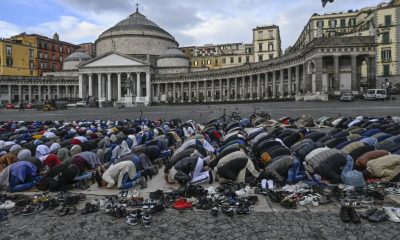
 International1 day ago
International1 day agoIn pictures: Eid celebrations around the world
-
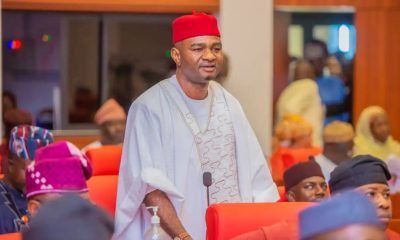
 metro3 days ago
metro3 days agoNatasha: Emmanuel Uduaghan threatens to sue Senator Nwaebonyi
-

 Auto3 days ago
Auto3 days agoLanre Shittu Motors to endow Automobile Department of Lagos Technical College

